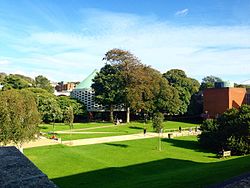Career
Sampson is a Fellow of the Royal Society of Arts, the British Computer Society and the Higher Education Academy. [2] He is also a Chartered Information Technology Professional. [2] He holds three MA degrees, one each from Cambridge, Yale, and Oxford. [2] After graduating from St. John's College, Cambridge, he went on to Yale, conducting research in the Linguistics and Engineering & Applied Science departments. [2] He was awarded a doctorate by Cambridge under the special regulations; [2] his published work was deemed to comprise "a significant contribution to scholarship". [3]
His academic career has included work in Asian languages, linguistics, and computing, with side interests in philosophy, and political and economic thought. He lectured at the London School of Economics, the University of Lancaster and the University of Leeds before moving to Sussex in 1991. [2]
Sampson is widely known for academic papers criticising the linguistic nativist movement, including the arguments of proponents such as Noam Chomsky, Jerry Fodor, and Steven Pinker. Sampson critically engaged with Pinker's 1994 book The Language Instinct , in his own book The 'Language Instinct' Debate , the first edition of which, published in 1997, was entitled Educating Eve.
This page is based on this
Wikipedia article Text is available under the
CC BY-SA 4.0 license; additional terms may apply.
Images, videos and audio are available under their respective licenses.

